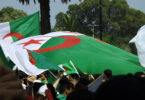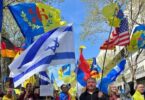The next electoral farce
The Algerian military regime is planning to hold what it calls ‘presidential elections’ on 7 September, paving the way for a second term for Abdelmadjid Tebboune. The majority of the Algerian people reject these electoral shams and their results, which it has made clear with slogans such as: ‘No elections with gangs’ and ‘Tebboune is an impostor, brought in by the military, he has no legitimacy’.
The Rachad movement believes that the forthcoming elections are futile because they are neither free nor fair. There is no point in elections based on laws promulgated by an illegitimate parliament, supervised by a non-independent High Electoral Supervisory Body subject to the dictates of the mukhabarate, and arbitrated by a judiciary subservient and subject to the will of the military. There is no point in elections in which the military authorities dictate the list of accepted and rejected candidates, and which are held in a climate where freedoms are confiscated, political organisations and parties repressed, and citizens imprisoned for their opinions. There is no point in holding elections in a context where the press is muzzled, its premises sealed off, and all demonstrations banned, even those in support of Gaza, in total contradiction with the official position of the Algerian regime in support of the Palestinian cause, all this in a flagrant violation of the country’s constitution and laws.
Elections are a democratic tool enabling the people to renew their representatives in a legal and institutional process that is transparent, free and fair. However, for the Algerian regime, elections are nothing more than a camouflage to perpetuate the military dictatorship. They are run by generals who violate the constitution and play politics behind the scenes, generals who are divided into factions that fight each other according to the law of the jungle, where cunning and deception reign supreme. The conflict between the military factions in power has been an ongoing reality since the dawn of independence in 1962, and this was recently demonstrated during the Hirak, which saw the imprisonment of more than 150 senior officers, a third of them generals who had held senior positions in the commands of military regions, the intelligence directorates, the gendarmerie and the police, not to mention the flight abroad of other generals, the most famous of whom are a former defence minister and a commander of the national gendarmerie. This conflict reflects the expansion of the militarisation of the state, and what is striking about the forthcoming presidential elections is the promulgation of a decree, the day before Tebboune’s candidacy was announced, legalising the army’s stranglehold on the country’s senior civilian public administration, in a clear message about the military’s desire to govern the country directly.
The current international climate and the tyranny of the ex-colonial powers are undoubtedly worrying, but the Rachad movement believes that this is no justification for repression and the pursuit of a policy of headlong rush, but rather this context should be an additional reason for speeding up the resolution of the key political problem in Algeria. Nothing deters or repels the external threat like the total cohesion between the people and their army, as we detailed in a previous letter entitled ‘Open letter to a brother of the People’s National Army’*.




